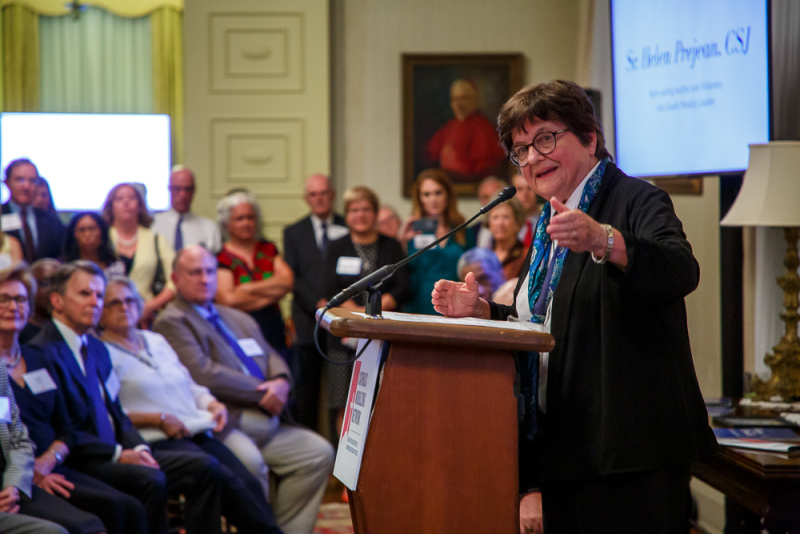
CATHOLIC MOBILIZING NETWORK MARKS 10TH ANNIVERSARY WITH FORWARD PUSH
Carol Zimmermann/Catholic News Service
10/14/2019
WASHINGTON (CNS) -- At the 10th anniversary celebration of the Catholic Mobilizing Network, a group that works to end the death penalty, the emphasis was more on the work ahead than on previous accomplishments.
"A lot has changed in our moving toward the abolition of the death penalty," said Karen Clifton, founder of the network, and one of three honorees at the Oct. 10 ceremony held on World Day Against the Death Penalty at the Vatican Embassy in Washington.
"I'm counting on you to carry it through to the finish line," she urged the group of Catholic leaders and anti-death-penalty advocates.
Clifton thanked Sister Helen Prejean, another honoree, saying that her stories about ministering to death-row inmates "woke me up." Sister Prejean, a Sister of St. Joseph of Medaille, is a longtime opponent of capital punishment.
Richard Dieter, a board member of the Catholic Mobilizing Network and former executive director of Death Penalty Information Center, introduced Sister Prejean as a "rock star" for her popularity from the "Dead Man Walking" movie made from her book of the same title. He went on to add that the woman religious has been "a rock to all of us in the death penalty movement."

longtime opponent of capital punishment, speaks to an
audience at the Vatican Embassy in Washington Oct. 10.
CNS photo/Jim Stipe, Catholic Mobilizing Network
"That fire is here tonight," she said, thanking advocates for their ongoing work.
She pointed out that Catholic attitudes have changed about the death penalty, telling the group that in the 1980s when she started her ministry, Catholics were primarily in favor of capital punishment.
That attitude change hasn't been complete, as retired Archbishop Joseph A. Fiorenza of Galveston-Houston, noted.
The archbishop, who also was honored at the anniversary celebration, said Pope Francis has made church teaching on the death penalty "abundantly clear," but he said that this still has not been accepted by all U.S. Catholics. "That's our work," he challenged the group.
The archbishop, former episcopal moderator for the Catholic Mobilizing Network, said the "struggle goes on" to increase Catholic opposition to the death penalty.
He put it this way: "Abolition of the death penalty is a pro-life issue" and taking it one step further, he added: "You can't truly be pro-life if you support the death penalty."
Bishop Daniel E. Flores of Brownsville, Texas, current episcopal moderator of the network, echoed a similar sentiment in his closing remarks, saying: "We live in a culture that likes to think of itself in favor of life except with the death penalty, an unintended pregnancy, a terminal illness or immigrants at the border."
It is in these difficult circumstances, he said, that the church must be the most clear in affirming the dignity of life.
Although speakers did not dwell on accomplishments of the Catholic Mobilizing Network, some mentioned that seven states have repealed the death penalty within the group's 10 years and a few also gave tribute to the victims' families, some of whom attended the ceremony.
"You proclaim the Gospel of forgiveness," Clifton said of these families who chose not to see the death penalty as an answer even if a family member had been killed. "You teach us about restorative justice."
Archbishop Christophe Pierre, the Vatican nuncio to the United States, welcomed guests to the "Holy Father's house" and told them the pope is "supportive of your work, so it is fitting that you should be here."
Washington Archbishop Wilton D. Gregory, who presented an award to Archbishop Fiorenza, said he has been to the Vatican Embassy many other times but had never seen as many people there as he did during this celebration.
"It's a sign the Holy Father's message is being received," he added.
Stavros Lambrinidis, European Union ambassador to the United States, pointed out that the European Union has long opposed the death penalty and that the United States "should also be in this group."
Essentially preaching to the choir, he spoke about problems with the death penalty, noting that it is irreversible, very often used on the poor and diminishes human dignity. He said he was inspired by the church's work to end capital punishment and honored to be with people who work every day in this cause.
"It's not an easy fight," he added.
That fight was reemphasized by Krisanne Vaillancourt Murphy, executive director of the Catholic Mobilizing Network, who thanked those whose vision got this movement started and those who continue it today.
To keep up the work, she urged those present to continue to educate themselves, do advocacy work and pray "mighty fearless prayers" to end the death penalty in this country.
-
